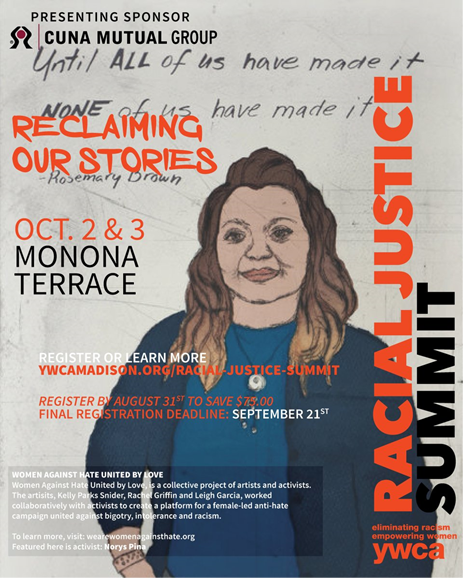
Representatives of the Office of Human Resources attended the 2018 YWCA Annual Racial Justice Summit in October at the Monona Terrace. The focus of this year’s summit was on ‘reclaiming our story.’ The HR Communities of Practice Office asked our OHR representatives what their most powerful insights were and what they felt was particularly useful for all of us in HR to consider.
My Experience as a First-Time Summit Attendee
This conference forced me to explore the magnitude of my own white privilege. I already knew that my whiteness affected how others treated me. I can go shopping without being followed and I have never been pulled out of an airport security line for further screening.
What was less obvious to me was that my white privilege affects how I interact with the world. In general, I can live with little to no consideration for how I perform life’s most routine tasks. I can enter a room without worrying if I’ll be the only white person there. Most strikingly, I can disengage from events in my workplace, city, country and world when I find them too disturbing. It became clear to me that others do not share this privilege.
I left this conference questioning all sorts of things, including myself. Who am I? What do I stand for? Am I living up to my own values? This was the point of the Racial Justice Summit for first-time summit goers like me. The more questions I asked myself, the more I realized how much there is to learn. My advice for others? Ask questions and listen. Listen to yourself and to those around you. We may all be surprised by what we learn.
My Most Powerful Insight: The Role of Legislation in Racial Injustice
I’ve always known that there are systemic racial barriers and disparities. Until I attended a seminar at this year’s summit, however, I hadn’t seen their origins so clearly and how they have been held in place over time by policies, legislation and even the use of violence.
The presenters of this seminar provided us with a historical timeline from 1776 to the present. Each table was assigned one of seven time periods and asked to research the period then present their findings to the larger group.
A clear pattern—of crucial stages of wealth accumulation for white people (even if wealth and privilege were not distributed evenly among whites), and laws to systematically deny others equal opportunity, and economic and political rights—was apparent.
The table at which I was seated focused on the period, 1878 – 1930: Open Doors to European Immigration. Consider:
- The 1890 Separate Car Act decreed “equal but separate accommodations for the white and colored races” on Louisiana railway cars.
- The 1882 Chinese Exclusion Act restricted the immigration of laborers entering the US; it compelled many living in the US to return to China to get a certificate of labor, then attempt to re-enter the country.
- The Dawes Act of 1887 allowed the President to divide Native American tribal land into individual allotments for families, undermining their tradition of collective land sharing. Each family was assigned a certain number of acres, and any leftover land was able to be purchased by white settlers, greatly decreasing the amount of land that was left.
These laws influenced how wealth was amassed and passed on to future generations. Over time, disparities continued to widen in areas including—but not limited to—housing, insurance rates, access to education, and voting rights.
There is a full-length version of this class as part of the Racial Justice Initiative. Please contact the YWCA for details. Let’s not have history continue to repeat itself.
What Can We in HR Do Now?
After attending this year’s YWCA Racial Justice Summit, I was reminded of how essential it is to make time for dialogue, to tell our stories, and to share our lived experiences.
I attended three keynote sessions and two breakout sessions that focused on (1) restorative justice in the workplace and (2) the power and influence of storytelling in our personal and professional lives, and its impact on sustainability of our inclusion and diversity efforts.
What resonated with me most—particularly with how we could make a shift in our current workplaces—was how storytelling through the lens of restorative justice can allow us to build and sustain healthy working relationships, and to create just and equitable learning environments. Restorative justice means the practice of repairing harm and transforming conflict by approaching dialogue in community-centered way (i.e., within the context of our work teams) with the vulnerability and strength to recognize that “offenses” may not be about an individual but rather about systems, structures and lived experiences.
The practice of telling our stories in the context of restorative justice centers us as people, and amplifies our human experiences in the workplace. It emphasizes that in order move forward through workplace conflict, we need to recognize that it is a shared responsibility.
As we make time and space for storytelling, we and our colleagues have an opportunity to share who we are and bring our true, authentic selves into the workplace. For more information, see the YWCA Racial Justice Initiative offerings.
To learn more about the 2018 Summit, reach out to Kate Miller, Leigh Baker, Sherry Boeger, Susan Fuszard, or Susan Tran Degrand.
You can also read more about the 2016 and 2017 Summits in the HR CoP Newsletter Archives:
October 2016 – scroll to 3rd article
October 2017 – scroll to 2nd article